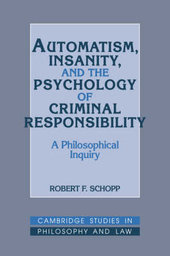
|
Automatism, Insanity, and the Psychology of Criminal Responsibility: A Philosophical Inquiry
Hardback
Main Details
| Title |
Automatism, Insanity, and the Psychology of Criminal Responsibility: A Philosophical Inquiry
|
| Authors and Contributors |
By (author) Robert F. Schopp
|
| Series | Cambridge Studies in Philosophy and Law |
|---|
| Physical Properties |
| Format:Hardback | | Pages:292 | | Dimensions(mm): Height 229,Width 152 |
|
| Category/Genre | Social and political philosophy |
|---|
| ISBN/Barcode |
9780521401500
|
| Classifications | Dewey:345/.04 342.54 345.04 |
|---|
| Audience | | Tertiary Education (US: College) | | Professional & Vocational | |
|---|
|
Publishing Details |
| Publisher |
Cambridge University Press
|
| Imprint |
Cambridge University Press
|
| Publication Date |
26 July 1991 |
| Publication Country |
United Kingdom
|
Description
This is a book about the role that psychological impairment should play in a theory of criminal liability. Criminal guilt in the Anglo-American legal tradition requires both that the defendant committed some proscribed act and did so with intent, knowledge, or recklessness. The second requirement corresponds to the intuitive idea that people should not be punished for something they did not do "on purpose" or if they "did not realize what they were doing." Although intuitive, this underlying idea can be highly controversial in practice, especially in cases involving the insanity defense. This important new book addresses the conceptual and moral foundations of these issues. Unlike many previous works in this area, it addresses the automatism and insanity defenses by examining the types of functional impairment that typical candidates for these defenses actually suffer. What emerges is a much wider conceptual framework that allows us to understand the significance of psychological states and processes for the attribution of criminal responsibility in a manner that is logically coherent, morally defensible, and consistent with research in psychopathology.
Reviews"Schopp's book is a collection of treasures, to be slowly and carefully unwrapped. It brings the reader to the heart of current debates in action theory, philosophy of mind, social psychology, and metaphysics. It offers a wealth of jurisprudential data and reflection to the legal philosopher, as well as calling to order the intransigent legal and philosophical categories of liability. But most significantly, it vindicates the philosophical enterprise in the legal context, offering up-to-date solutions to some traditional problems that have vexed and embarrassed both law and philosophy." Canadian Philosophical Reviews
|